14 start with M start with M

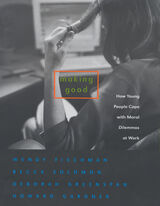
You're young, ambitious, entering the field of your dreams; you're on your own, the competition is fierce--and then you see your chance: the big story, the big role, the big discovery. But you'll have to cut a few corners, bend the rules, cheat a bit. What choices will you make?
After studying more than a hundred young people launching their careers, these longtime researchers of "good work"--work that is both skillful and honorable--find unsettling answers. Although young workers know what it takes to do good work, they don't always feel they can follow the ethical route. "Later, when I'm successful," is their implicit promise.
Making Good explores the choices confronting young workers who join the ranks of three dynamic professions--journalism, science, and acting--and looks at how the novices navigate moral dilemmas posed by a demanding, frequently lonely, professional life. The authors also uncover striking comparisons between these young professionals and the veterans in their fields--most notably, older workers recall inspiring models and mentors, while today's beginners see themselves as on their own. With extensive insights into how young workers view their respective domains, the nature of their ambitions, the sacrifices they are willing to make, and the lines they are prepared to cross, this study will prove instructive to young employees and employers alike, as well as to those who wish to understand the shifting moral and social character of the working world.

Mal Goode (1908–1995) became network news’s first African American correspondent when ABC News hired him in 1962. Raised in Homestead and Pittsburgh, he worked in the mills, graduated from the University of Pittsburgh, and went on to become a journalist for the Pittsburgh Courier and later for local radio. With his basso profundo voice resonating on the airwaves, Goode challenged the police, politicians, and segregation, while providing Black listeners a voice that captured their experience. Race prevented him from breaking into television until Jackie Robinson dared ABC to give him a chance. Goode was uncompromising in his belief that network news needed Black voices and perspectives if it were to authentically reflect the nation’s complexities. His success at ABC initiated the slow integration of network news. Goode’s life and work are remarkable in their own right, but his struggles and achievements also speak to larger issues of American life and the African American experience.
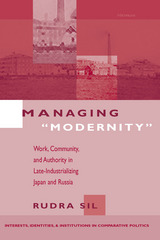
Managing "Modernity" engages a variety of intellectual perspectives in the social sciences. The theoretical approach represents a conscious effort to overcome the contentious debates in political science and sociology among proponents of historical institutionalism, cultural analysis, and rational-choice theory. The substantive argument draws on, and partially integrates, concepts and findings from comparative politics, economic sociology, industrial relations, organization theory, business management, and the political economy of Japan and Russia.
In light of ongoing debates over the significance and impact of "globalization," the eclectic and integrative approach in Managing "Modernity" offers a fresh and provocative contribution that will interest scholars and graduate students across a variety of disciplines and subfields. It offers compelling insights to anyone generally concerned with the social forces that facilitate or hinder the diffusion of ideas and institutions across national boundaries.
Rudra Sil is Janice and Julian Bers Assistant Professor in the Social Sciences, Department of Political Science, University of Pennsylvania.

This volume constitutes an achievement nowhere duplicated in the three related and critical areas of education, work, and manpower policy. It is the mature production of over a dozen years of research-endeavors by the dean of manpower studies.
In Part I Eli Ginzberg warns against simplistic reliance on prevailing models—economic, psychological, or political. There is only tenuous evidence that enormous expenditure leads to increased social benefit. Rather, we need a more appropriate framework for analyzing human resources, and we ought to be skeptical of a theory that predicates an underlying rationalism for much, if not all, human behavior. Specifically, the author doubts that education can be a substitute for the family, cure poverty or racism, assure an individual a job, give a person a decent income, or control crime and delinquency. What it can do is help students acquire basic skills and thereby help them to live and manage their lives better. The author suggests that we ought to set realistic goals for our schools and insist on accountability.
Part II turns to work and its discontents. Ginzberg examines the changing role of women, the position of blue-collar workers, labor reforms suggested in America and abroad, and the place of the work ethic.
Part III focuses mostly on public employment policy, which can improve the manpower system but can only be a minor instrument for promoting economic growth, redistributing income, shifting consumer demand to public services, or eliminating substandard jobs. The discussion will be eagerly read by those seeking to generate jobs for the unemployed.
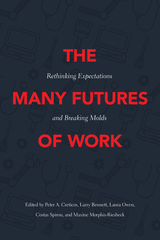
What will work eventually look like? This is the question at the heart of this timely collection. The editors and contributors—a mix of policy experts, academics, and advocates—seek to reframe the typical projections of the “future” of work. They examine the impact of structural racism on work, the loss of family‑sustaining jobs, the new role of gig work, growing economic inequality, barriers to rewarding employment such as age, gender, disability, and immigration status, and the business policies driving these ongoing challenges.
Together the essays present varied and practical insights into both U.S. and global trends, discuss the role of labor activism in furthering economic justice, and examine progressive strategies to improve the experience of work, wages, and the lives of workers. The Many Futures of Work offers a range of viable policies and practices that can promote rewarding employment and steer our course away from low-wage, unstable jobs toward jobs that lead to equitable prosperity and economic inclusion.
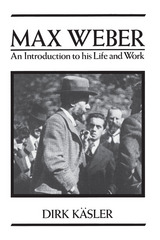
Käsler offers a comprehensive account of Weber's views, giving attention both to the context in which Weber produced his most significant contributions to social science, and to the changes involved in his work over the course of his career. This volume also serves as an introduction to the controversies that Weber's writings have stimulated, from the time of their first appearance to the present day.
This book will be of vital interest to anyone concerned with Max Weber and will undoubtedly become the leading student text on Weber in the English-speaking world.

This volume is not a collection of artifacts from past decades of philosophy. Instead, it is a collection of essays that each make a significant contribution to contemporary work in philosophy. This reflects the fact that Gibbard’s work has not only had a massive influence on past discussion in philosophy but also continues to influence new directions of philosophical research.
With contributions from:
Sara Aronowitz, Simon Blackburn, Paul Boghossian, David Braddon-Mitchell, Nate Charlow, Stephen Darwall, Jamie Dreier, Billy Dunaway, Melissa Fusco, Sona Ghosh, Allan Gibbard, Bill Harper, Paul Horwich, Zoë Johnson King, Tristram McPherson, Howard Nye, Lauren Olin, Caleb Perl, David Plunkett, Peter Railton, Connie Rosati, Mark Schroeder, Alex Silk, Daniel J. Singer, Brian Skyrms, and Seth Yalcin.




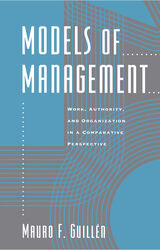
Guillén's study of two liberal-democratic societies (the United States and Great Britain) and two corporatist societies (Germany and Spain) reveals significant differences in the way managerial elites and firms have adopted the three models. His data show that ideas themselves—independent of material interests and technology—can cause organizational change. Throughout the book, contrasts between modernist-technocratic and liberal-humanist mentalities, as well as between Protestant and Catholic religious backgrounds, emerge as decisive factors in determining managerial ideology and practice.
In addition to analyzing management methods in organizations, Guillén explores larger issues: the interaction among managerial, government, and labor elites; the impact of the state and the professions on managerial behavior; and the role that managers play in modern societies.
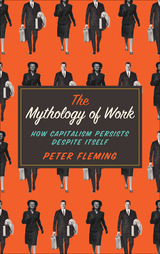
In The Mythology of Work, Peter Fleming examines how neoliberal society uses the ritual of work—and the threat of its denial—to maintain the late capitalist class order. Work becomes a universal reference point, devoid of any moral or political worth, transforming our society into a factory that never sleeps. Blending critical theory with recent accounts of job-related suicides, office-induced paranoia, fear of relaxation, managerial sadism, and cynical corporate social responsibility campaigns, Fleming paints a bleak picture of a society in which economic and emotional disasters greatly outweigh any professed benefits.
READERS
Browse our collection.
PUBLISHERS
See BiblioVault's publisher services.
STUDENT SERVICES
Files for college accessibility offices.
UChicago Accessibility Resources
home | accessibility | search | about | contact us
BiblioVault ® 2001 - 2024
The University of Chicago Press









